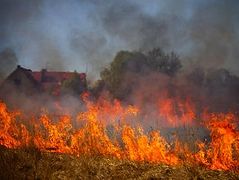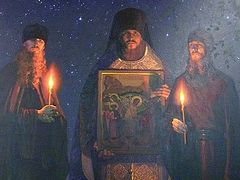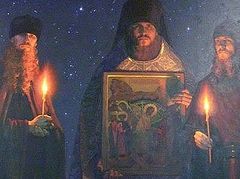April 18, 1993. On that day of the Radiant Resurrection of Christ, Paschal joy was mixed with sorrows in the hearts of many people in Russia. For many of us visited Optina Monastery, where we were welcomed by the merciful guestmaster Fr. Trophim; fed in the refectory by Fr. Ferapont, “an angel of silence”; and Hieromonk Vasily heard our confessions and gave us Communion in church. All three of them possessed the gifts of the Holy Spirit. Our grief for them was heartfelt. It is certain that they now dwell in eternal blessedness with Christ, but we will never see or hear them again in this life. But why did the Lord decide to take them, the best of us, at that time? Because they were ready to become the first victims of that bloody year. [The year of the so-called Russian Constitutional Crisis of September and October 1993, in which as a result of the feud between President Boris Yeltsin and the old Parliament, the former dissolved the Supreme Soviet and in effect took all power into his own hands. In the bloodbath of that period very many people, including civilians, were killed in the streets and squares of central Moscow, and the exact number of victims is still unknown.—Trans.].
“I am ready, o Lord!”
(Fr. Trophim)
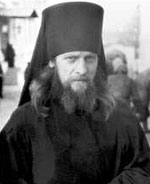 Riasophore-Monk Trophim (Tatarnikov) of Optina. Murdered on Pascha in 1993 by a satanist My son (who then was about twelve) and I visited Optina Monastery for the first time at the end of August, 1989, soon after it had been returned to the Russian Orthodox Church.
Riasophore-Monk Trophim (Tatarnikov) of Optina. Murdered on Pascha in 1993 by a satanist My son (who then was about twelve) and I visited Optina Monastery for the first time at the end of August, 1989, soon after it had been returned to the Russian Orthodox Church.
We had read a lot about Optina Monastery and its holy elders and had seen it only in photographs of pre-revolutionary books. At that time the monastery was in ruins—the Bolsheviks had caused more destruction than Batu Khan in the thirteenth century.
The brethren had only restored the little church-over-the-gate by the time of our visit and worshipped in it.
But in spite of the desolation the brethren received pilgrims, following the centuries-old tradition of the monastery. They cleared two big rooms which were had the old-fashioned name, the men’s lodgings and the women’s lodgings respectively. I was only allowed to look into the women’s room and I’d better not tell you what awful conditions people had to sleep in there.
Pilgrims advised me that I approach the guestmaster Leonid, who would tell me where I should go. We went to the half-ruined Cathedral of the Entry of the Mother of God into the Temple. Soon the guestmaster Leonid came up to us headlong (he always did everything in a hurry). He was tonsured a monk with the name Trophim a year later. I had seen such riasophore-monks only on pictures by Nesterov and icons before then! He was so thin that he seemed weightless (in reality, as I learned afterwards, he was so strong that he could tie a poker into knots). His eyes scintillated and their blue color merged with the sky. Unfortunately, no photograph mirrors his real appearance.
“Can you bless my son and I to stay overnight somewhere?” I asked.
“Do, please. You will be accommodated in the women’s room, and your son—in the men’s part,” Leonid said without seeing my passport (though it is always done in other monasteries). Of course, he saw me clutch my child’s hand, as if saying: “I won’t let him go alone!” But he averted his eyes and said quietly: “Such are our rules.” And he flew off.
Monastery rules are a serious matter. We attended the service at the church-over-the-gate. When the service was over and the people left, I (unable to restrain myself) went to complain to St. Ambrose of Optina in front of his icon (of course, in my mind and not aloud): “Holy elder, you know how much we love you, how long it has taken us to get here! And now we have nowhere to stay overnight. So I have to let my child go to ‘the men’s part’! Bear in mind!”
Then we went to the skete. When we came back to the monastery, my brave son went to the men’s room. Meanwhile, I sat down on a small bench. All of a sudden I saw my son come out: “Mommy! The guestmaster Leonid has given us the keys to a room on the first floor where we can spend the night alone! He asked me if I am the boy who came from Moscow with his mother. I said it is me. Come along! He has shown me the room.”
We opened the door of that small room: two absolutely new mattresses lay on the freshly washed floor with new soldiers’ blankets on them. Two chairs were thoughtfully placed beside the mattresses. It was truly a “royal chamber” for us, given the utter desolation of that place.
Our generous guestmaster came running into the room. What he held in his hands was imported bed linen of extraordinary beauty which was still unwrapped. He obviously did not hear my words of appreciation. He dropped his head and said quietly and regretfully: “That is all I can do for you.” Suddenly he remembered something and added: “A car will go from the monastery to Moscow tomorrow after the early Liturgy. Find me and I will arrange the car to take you back to Moscow.”
“No, no! Thank you. We will travel on our own somehow,” I answered fearfully. And I thought: “You, our poor angel-guestmaster, will surely catch it from the abbot for showing so much favor to perfect strangers!”
“Well, as you wish,” novice Leonid, the future Fr. Trophim, said. “But anyway there will be a car...” And he left hurriedly.
Later I learned that Fr. Trophim slept only three hours a day, in the kneeling position, resting his hands on the chair, and that he was constantly being reproached for something and nevertheless rejoiced. Every morning he would wake up before everyone else, rush towards the prosphora bakery to bake prosphora before the beginning of the service, then dash into the cowshed to milk the cows, then work in the field on the tractor, and finally arrange accommodation for pilgrims. He prayed at all services at the monastery, and served as an acolyte and a bell-ringer at church simultaneously. Fr. Trophim observed a very long prayer rule and he received from God the gift of unceasing Jesus Prayer.
The future martyr’s mother related that their great-grandfather had moved from St. Petersburg, where he had served at the court of St. Nicholas II, to their Siberian village that consisted of a handful of houses. After the Revolution he had to hide himself from the Bolsheviks, so he settled in the taiga [the swampy coniferous forest of high northern latitudes between the tundra and steppes of Siberia.—Trans.], at the back of beyond. It was there that the new martyr Fr. Trophim was born. In his childhood he was a herds boy, assisting a very stern herdsman who looked after the village livestock. The village residents often heard the herdsman scold the boy, and the boy was silent. One day his mother said to him: “Sonny, leave him! We will get along somehow.” And they lived in need after the death of Fr. Trophim’s father. But the boy defended the herdsman, trying to justify him: “Mommy, he is very good!”
His mother also related that when her son after the army worked on a trawler he would often travel abroad and bring beautiful clothes for the family and friends from there. “Why do you never bring anything for yourself, son?” she would ask him. “I don’t need anything! I am happy when I see your joy.” Whenever he happened to acquire some beautiful thing—for example, a leather jacket, somebody immediately asked him to lend it to them for a while. He would give it to them without a second thought and never remembered it afterwards.
This is what the young man’s outward life was like. But there was an inner, spiritual life behind it. The boy who grew up in a remote Siberian village with the nearest church many miles away, wanted to find the purpose of life from childhood and would often run deep into the forests “to seek God”. When in his youth he worked on the railroad he wrote in his diaries: “A road is like life. It runs for miles, but then it ends. We need to ‘apply the brakes’ near churches as often as possible and confess our sins. This world is nearing its end, and we need to have time to repent.” And further: “The most important thing in this life is to learn to truly love people.”
In the Gospel he was astounded by the following words of Christ: In the world ye shall have tribulation: but be of good cheer; I have overcome the world (Jn. 16:33).
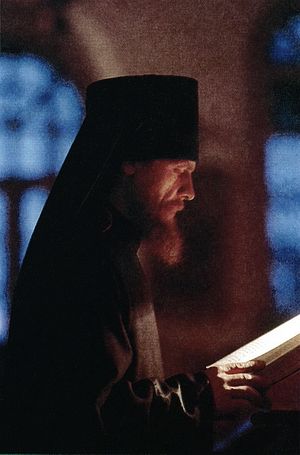 Fr. Trophim When his mother first visited him at Optina Monastery, which still lay in ruins, she said: “My dear son, come back home!” But he replied: “I didn’t do it of my own accord. It was the Mother of God Who brought me here.” His mother also recalled that Fr. Trophim was going to join Optina Monastery right after it had been opened. But in that very moment his documents and money were stolen. And the future monk said decisively: “I will go to the monastery, even if I will have to walk the ties.” And by the will of God he managed to collect money and have his documents recovered very quickly.
Fr. Trophim When his mother first visited him at Optina Monastery, which still lay in ruins, she said: “My dear son, come back home!” But he replied: “I didn’t do it of my own accord. It was the Mother of God Who brought me here.” His mother also recalled that Fr. Trophim was going to join Optina Monastery right after it had been opened. But in that very moment his documents and money were stolen. And the future monk said decisively: “I will go to the monastery, even if I will have to walk the ties.” And by the will of God he managed to collect money and have his documents recovered very quickly.
After the early Liturgy my son and I were walking through the woods towards Kozelsk [the nearest town to Optina Monastery in the Kaluga region.—Trans.]. I was thinking about what had happened to us. It was obviously something important, but what exactly? And later I understood: we had gone to Optina Monastery with love for the elders to receive love from the elders. And by the mercy of God we received this precious treasure through Fr. Trophim.
According to evidence of many pilgrims, Fr. Trophim was close to the Holy Optina Elders in spirit. Like the Holy Elders Ambrose and Nektary, he would speak with them by means of short, rhymed aphorisms, often in a humorous manner. For example, whenever he saw a pilgrim smoking behind the monastery’s fence, he would say with a smile: “The man who smokes tobacco doesn’t belong to Christ!” And it was said that many gave up smoking after hearing these words from him. He used to say to those who could contain this: “Bend yourself into a triangle and be a servant to everyone.” Or: “Frivolous pleasures intensify passions. And the stronger your passion the more difficult to master it.” Some heard the following words from him: “You cannot do anything without the grace of God just as a blacksmith cannot forge anything without fire.” Even if he was openly tricked, he was not upset at all. He tried not to stand out and he always appeared at the right time where his help was needed.
Once a coach driver who brought a group of pilgrims to Optina Monastery denounced the generous guestmaster for going beyond the monastery’s fence and helping a young woman carry her heavy bags. Fr. Trophim said to him: “Brother, I am sorry for confusing you. But ‘inok’ [the old Russian word “inok” means “monk”. This word literally means “inoy”—that is, “other”, “different”.—Trans.] is not somebody who runs away from people but somebody who lives his life in a different way—God’s way.”
My second meeting with Fr. Trophim took place in the autumn of 1990, when I came to Optina Monastery with a group of Orthodox journalists to conduct an interview with its second archimandrite (he is now the retired Metropolitan Evlogy [Smirnov] of Vladimir). During his abbacy the monastery was transformed and restored to its former glory. The Cathedral of the Entry of the Theotokos into the Temple had been adapted to hold church services, all the monastery’s buildings were bright white, and the paths were paved with bricks.
At the end of the talk the archimandrite said: “I will provide you with ‘royal accommodations’: you will sleep in the cells where nuns from Shamordino Convent usually stay.” He pulled the bell to the right of him, and Fr. Trophim dashed into the room headlong. His intelligent, attentive eyes expressed his keenness to carry out any instruction of the abbot without delay.
“Brother, lead them to the sleeping quarters,” the future Metropolitan Evlogy said.
Fr. Trophim led us towards the cells, but on his way suddenly stopped not far from the foundation of a temporary bell-tower near the site where the humble graves of the three new martyrs of Optina would appear a few years later, and asked us to wait. Riassophore-Monks Trophim and Ferapont had built this platform, on which they were to sacrifice their lives, with their own hands. Today it is a shrine for pilgrims who venerate it as they venerate the modest crosses on their graves. We should have stood and prayed on that holy spot, but we understood nothing and started to discuss something animatedly.
Then the father-superior came out on the porch of his cell. He looked at us just as Christ looked at the crowd that was passing by His Cross and prayed for them: Father, forgive them; for they know not what they do (Lk. 23:34). Did he have a presentiment about their martyrdom, as the new martyrs themselves did? I don’t know. But what he did feel is that this place is holy. We drew ourselves up at attention, like guardsmen at a parade, and one of us said:
“We are sorry, Fr. Evlogy.”
“Yes, yes. No problem,” he answered sadly and left.
Fr. Trophim came flying. He gestured us towards the cells and led us up to them. I was never to see him again. As was related, though Fr. Trophim was ever tireless, at the beginning of Holy Week he suddenly sat down on a step in front of the altar during a service and said in a low voice: “I am ready, o Lord.” The brethren didn’t understand what he meant by these words. After the Paschal service the three new martyrs hardly touched the food at the festal table and soon stood up to perform their obediences. Hieromonk Vasily was to go to the skete to hear confessions, while Fr. Trophim and Fr. Ferapont were to go to the above-mentioned foundation of the bell-tower to ring the bells for the early Liturgy. First the murderer’s dagger pierced the body of Fr. Ferapont and then of Fr. Trophim. Though the latter was transfixed by the pain, he, driven by love for people, rang the alarm bell with his last strength. The brethren suspected that something was wrong there and went to the bell-tower. Nobody else was killed on the territory of the monastery, but on the way to the skete this man (either a satanist or an insane killer) caught up with Hieromonk Vasily and pierced him through with his dagger.
When I visited Optina Monastery for the third time, I venerated the graves of Fr. Trophim and the other two brothers who had been slain with him. It was Bright Week. The sun was playing and birds singing. I apologized to Fr. Trophim for a long time for not having been able to return his love in Christ (in the spirit of Optina) in this life. I could have returned this love only by loving people in the same spirit. But I didn’t have this love.
I took a path towards the skete. As I walked amid the pine trees, I saw an elder walking towards me, who inclined his head, immersed in prayer. I thought, “We, sinful and vain people, come here and interrupt the prayer of holy men.” I hugged a pine, so ashamed that I wished the earth could swallow me up. But the elder lifted his head, looked at me with the young, sparkling eyes of Fr. Trophim and greeted me: “Christ Is Risen!”
It was said that when Fr. Trophim’s brother came to his grave he asked in a perplexed tone: “What shall we do? You are dead…” So he could hardly believe this. And at that moment he heard very clearly: “Brother, love doesn’t die…”
An angel of silence
(Fr. Ferapont)
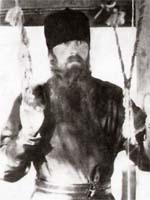 Riassophore-Monk Ferapont (Pushkarev) of Optina. Killed by a satanist on Pascha, 1993 It was the monks who called Fr. Ferapont “an angel of silence”. And monks never speak too much. Fr. Ferapont explained to one brother that he kept silence not because he had taken the vow of silence but because he had realized that words can easily hurt people and rob them of peace of mind. That is why he decided that it would be better to speak less.
Riassophore-Monk Ferapont (Pushkarev) of Optina. Killed by a satanist on Pascha, 1993 It was the monks who called Fr. Ferapont “an angel of silence”. And monks never speak too much. Fr. Ferapont explained to one brother that he kept silence not because he had taken the vow of silence but because he had realized that words can easily hurt people and rob them of peace of mind. That is why he decided that it would be better to speak less.
Like Fr. Trophim, Fr. Ferapont was born in a remote Siberian hamlet. He left his native village too because “there was a spiritual swamp there”, as he called it. There were no churches in the area, and young people were ruining themselves by drinking. In one small Siberian town he studied to become a forest ranger. Teetotalling students practiced yoga there. It was a paradox of the Soviet system: Youth were forbidden to go to church but allowed to join sects. Drinking and smoking were tolerated as well.
Fr. Ferapont, who was then Vladimir Pushkarev, discerned that yoga is a dangerous spiritual discipline after the first several lessons. He wrote to his friend: “Yoga is a swamp, like what I saw in my native village. The only difference is that in the village they are intoxicated by liquor and here they are intoxicated by pride.”
After college he lived alone in the forest near Lake Baikal for several years. Eventually he realized that where there is no church there is no life. This is what he revealed to one brother: “If only you knew how much suffering I experienced in my path towards Christ.” He related that in isolation amid the forests he had been attacked directly by demons. But he acquired the fear of God there. He used to say, “Fear of everlasting torments cleanses us from our passions.” In the forest he learned not only to keep his mouth shut but also to keep his mind quiet.
From the Baikal region he went to his uncle who lived in Rostov-on-Don [a port city and the administrative center of the Southern Federal District of Russia.—Trans.]. There he worked as a janitor at the Church of the Nativity of the Mother of God. He also visited the Holy Trinity—St. Sergius Lavra, where Archimandrite Kirill (Pavlov) advised him to take up the monastic life. He came to Optina Monastery in 1990. His obedience, the most difficult one, was in the kitchen. Whenever he said something to others, he did it very meekly and cautiously so as not to upset or confuse anybody. And he never judged anyone.
In 1991, he returned to his native village to say good-bye to his family and friends. He said to his relatives: “You will never see me again.”
He would also explain the reason behind his taciturnity in the following way: “He who keeps silence acquires light in his soul, and his passions are revealed to him.” Fr. Ferapont never skipped church services and was a virtuoso bell-ringer. And, like Fr. Trophim, he received the gift of unceasing Jesus Prayer.
Before Pascha of 1993 he gave away all his possessions. And he was the first to be pierced through by the killer’s long dagger. Pray for us, Riassophore-Monk Ferapont, “an angel of silence”! When I write about you, I am ashamed of my talkativeness.
A preacher
(Hieromonk Vasily)
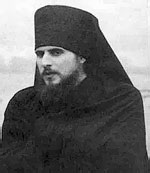 Hieromonk Vasily (Roslyakov) of Optina Monastery. Murdered on Pascha in 1993 by a satanist Several books have been written on Fr. Vasily (secular name: Igor Roslyakov) by people who knew him well. He graduated from the Department of Journalism of Lomonosov Moscow State University and was a prominent athelete (a member of the Russian national water polo team). His collected sermons and spiritual poems were published too, and the website of Optina Monastery contains his detailed biography in Russian. I would like to conclude my account of the three new martyrs of Optina Monastery with Fr. Vasily’s entry to the monastery’s chronicle, made on his first Pascha there:
Hieromonk Vasily (Roslyakov) of Optina Monastery. Murdered on Pascha in 1993 by a satanist Several books have been written on Fr. Vasily (secular name: Igor Roslyakov) by people who knew him well. He graduated from the Department of Journalism of Lomonosov Moscow State University and was a prominent athelete (a member of the Russian national water polo team). His collected sermons and spiritual poems were published too, and the website of Optina Monastery contains his detailed biography in Russian. I would like to conclude my account of the three new martyrs of Optina Monastery with Fr. Vasily’s entry to the monastery’s chronicle, made on his first Pascha there:
“My heart understands as never before that all that we receive from God we receive gratuitously. Our imperfect offerings are overshadowed by God’s generosity and become invisible just as fire becomes invisible in the dazzling sunlight… Bright Week passes like one day… Time doesn’t return until Bright Saturday… Optina Monastery is being revived and the truth is being restored… And Christ Who is risen from the dead is the Head of everything: Now will I rise…, now will I be exalted (Is. 33:10).”

